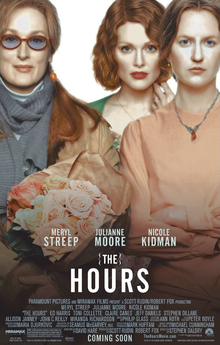Box office
The Hours opened in New York City and Los Angeles on Christmas Day 2002 and went into limited release in the United States and Canada two days later. It grossed $1,070,856 on eleven screens in its first two weeks of release. On January 10, 2003, it expanded to 45 screens and the following week it expanded to 402. On February 14, it went into wide release, playing in 1,003 theaters in the US and Canada. [3] With an estimated budget of $25 million, the film eventually earned $41,675,994 in the US and Canada and $67,170,078 in foreign markets for a total worldwide box office of $108,846,072. It was the 47th highest-grossing film of 2002. [3]
Critical response
On the review aggregation website Rotten Tomatoes, 80% of 196 critics gave the film a positive review and an average rating of 7.4/10. The site's critics consensus reads, "The movie may be a downer, but it packs an emotional wallop. Some fine acting on display here." [4] On Metacritic, the film has a weighted average score of 80 out of 100, based on 40 critics, indicating "generally favorable reviews". [5] Audiences surveyed by CinemaScore gave the film an average grade of "B−" on an A+ to F scale. [6]
Richard Schickel of Time criticized the film's simplistic characterization, saying, "Watching The Hours, one finds oneself focusing excessively on the unfortunate prosthetic nose Kidman affects in order to look more like the novelist. And wondering why the screenwriter, David Hare, and the director, Stephen Daldry, turn Woolf, a woman of incisive mind, into a hapless ditherer." He also criticized its overt politicization: "But this movie is in love with female victimization. Moore's Laura is trapped in the suburban flatlands of the '50s, while Streep's Clarissa is moored in a hopeless love for Laura's homosexual son (Ed Harris, in a truly ugly performance), an AIDS sufferer whose relentless anger is directly traceable to Mom's long-ago desertion of him. Somehow, despite the complexity of the film's structure, this all seems too simple-minded. Or should we perhaps say agenda-driven? This ultimately proves insufficient to lend meaning to their lives or profundity to a grim and uninvolving film, for which Philip Glass unwittingly provides the perfect score—tuneless, oppressive, droning, painfully self-important." [7]
Stephen Holden of The New York Times called the film "deeply moving" and "an amazingly faithful screen adaptation" and added, "Although suicide eventually tempts three of the film's characters, The Hours is not an unduly morbid film. Clear-eyed and austerely balanced would be a more accurate description, along with magnificently written and acted. Mr. Glass's surging minimalist score, with its air of cosmic abstraction, serves as ideal connective tissue for a film that breaks down temporal barriers." [8] Mick LaSalle of the San Francisco Chronicle observed, "Director Stephen Daldry employs the wonderful things cinema can do in order to realize aspects of The Hours that Cunningham could only hint at or approximate on the page. The result is something rare, especially considering how fine the novel is, a film that's fuller and deeper than the book ... It's marvelous to watch the ways in which [David Hare] consistently dramatizes the original material without compromising its integrity or distorting its intent ... Cunningham's [novel] touched on notes of longing, middle-aged angst and the sense of being a small consciousness in the midst of a grand mystery. But Daldry and Hare's [film] sounds those notes and sends audiences out reverberating with them, exalted." [9]
Peter Travers of Rolling Stone awarded the film, which he thought "sometimes stumbles on literary pretensions", three out of four stars. He praised the performances, commenting, "Kidman's acting is superlative, full of passion and feeling ... Moore is wrenching in her scenes with Laura's son (Jack Rovello, an exceptional child actor). And Streep is a miracle worker, building a character in the space between words and worlds. These three unimprovable actresses make The Hours a thing of beauty." [10]
Philip French of The Observer called it "a moving, somewhat depressing film that demands and rewards attention." He thought "the performances are remarkable" but found the Philip Glass score to be "relentless" and "over-amplified". [11] Steve Persall of the St. Petersburg Times said it "is the most finely crafted film of the past year that I never want to sit through again. The performances are flawless, the screenplay is intelligently crafted, and the overall mood is relentlessly bleak. It is a film to be admired, not embraced, and certainly not to be enjoyed for any reason other than its expertise." [12] Peter Bradshaw of The Guardian rated the film three out of five stars and commented, "It is a daring act of extrapolation, and a real departure from most movie-making, which can handle only one universe at a time ... The performances that Daldry elicits ... are all strong: tightly managed, smoothly and dashingly juxtaposed under a plangent score ... Part of the bracing experimental impact of the film was the absence of narrative connection between the three women. Supplying one in the final reel undermines its formal daring, but certainly packs an emotional punch. It makes for an elegant and poignant chamber music of the soul." [13]
In 2025, it was one of the films voted for the "Readers' Choice" edition of The New York Times ' list of "The 100 Best Movies of the 21st Century", finishing at number 300. [14]
